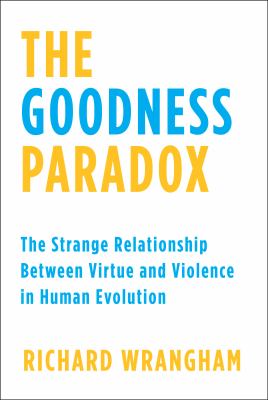 My goodness … we are indeed a strange species!
My goodness … we are indeed a strange species!
Dr. Wrangham, a Harvard anthropologist, tackles his subtitle, “The Strange Relationship Between Virtue and Violence in Human Evolution,” by going on to suggest, “We can be the nastiest of species and also the nicest.”
But, he offers, “The key fact about humans is that within our social communities we have a low propensity to fight. Compared to most wild mammals we are very tolerant.” One possible reason for this is “the domestication syndrome,” a process that started over 300,000 years ago, and, incidentally, is also found among some species of dogs and sheep.
Are we going to continue to evolve towards more pacifism, as Steven Pinker also suggests in his The Better Angels of Our Nature (2011), or might we regress?
Will our “progress’ continue or might we revert to once prevalent habits?
Wrangham notes that in 17th century New England, ‘”You could be executed for witchcraft, idolatry, blasphemy, rape, adultery, bestiality, sodomy, and, in New Haven, masturbation.”
Our altruism has continued to evolve within Homo sapiens, as we have delighted in “the sheer cosmological fascination of understanding where we come from,” and recognized that altruism is inherently more successful.
Edward O. Wilson also proposed this idea in Genesis* (2019): groups of altruists always beat aggressive groups. Wrangham also offers the idea that “docility … seems likely to be a vital precondition for advanced cooperation and social learning.” Chimpanzees lack this “docility,” while bonobos (pygmy chimpanzees), who are much closer to we humans in their development, seem to have it.
How will our genes move us in the future?
Might our natural “evolution” towards pacifism stall, and might other creatures move faster in that direction, adopting and encompassing altruism and docility, and therefore survive?
Dr. Wrangham challenges us to think seriously about these questions.
Editor’s Note: ‘The Goodness Paradox’ by Richard Wrangham is published by Pantheon Books, New York 2019.
*Read Felix Kloman’s review of ‘Genesis’ by Edward O. Wilson at this link.

Felix Kloman
About the Author: Felix Kloman is a sailor, rower, husband, father, grandfather, retired management consultant and, above all, a curious reader and writer. He’s explored how we as human beings and organizations respond to ever-present uncertainty in two books, ‘Mumpsimus Revisited’ (2005) and ‘The Fantods of Risk’ (2008). A 20-year resident of Lyme, he now writes book reviews, mostly of non-fiction, a subject which explores our minds, our behavior, our politics and our history. But he does throw in a novel here and there.
For more than 50 years, he’s put together the 17 syllables that comprise haiku, the traditional Japanese poetry, and now serves as the self-appointed “poet laureate” of Ashlawn Farm Coffee, where he may be seen on Friday mornings. His late wife, Ann, was also a writer, but of mystery novels, all of which begin in a village in midcoast Maine, strangely reminiscent of the town she and her husband visited every summer.